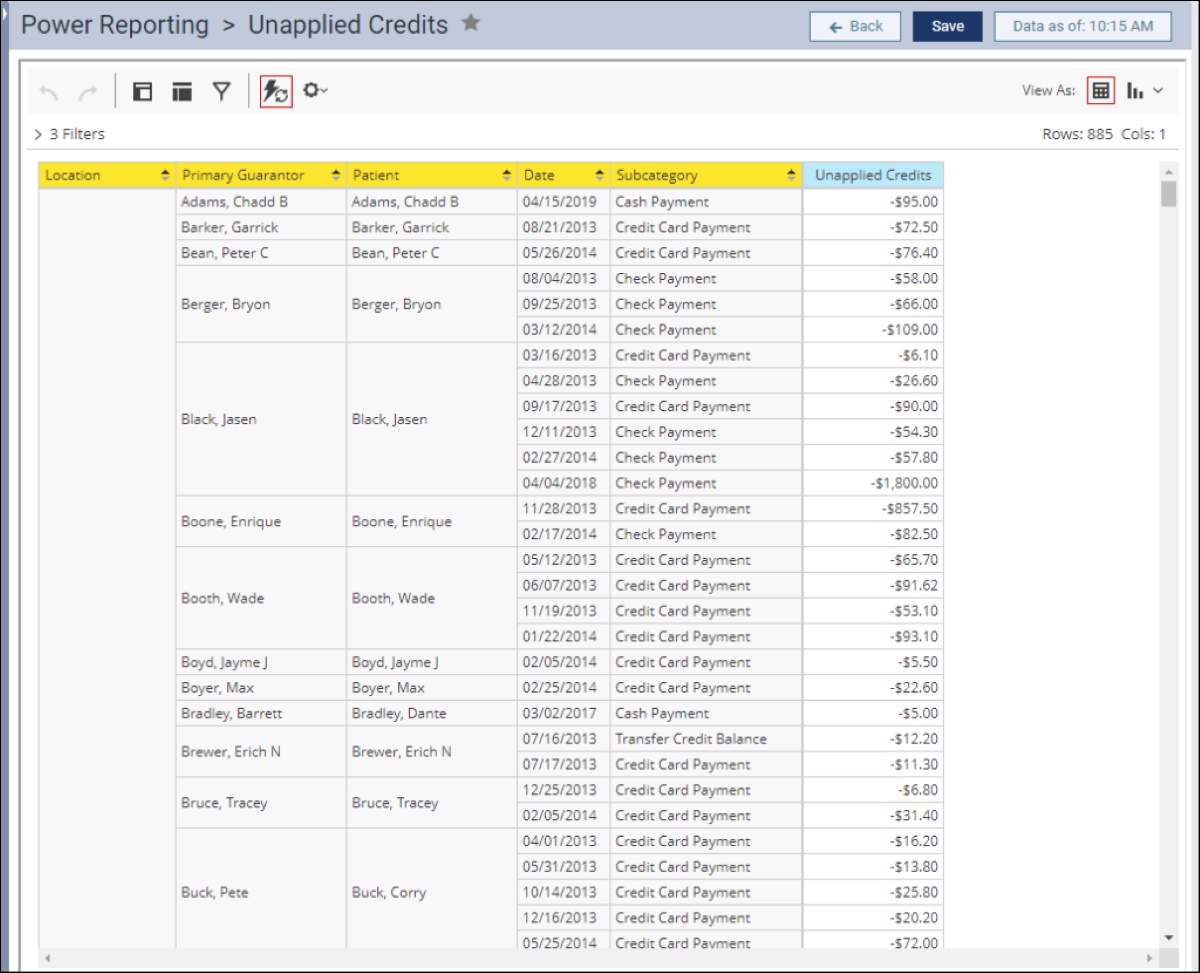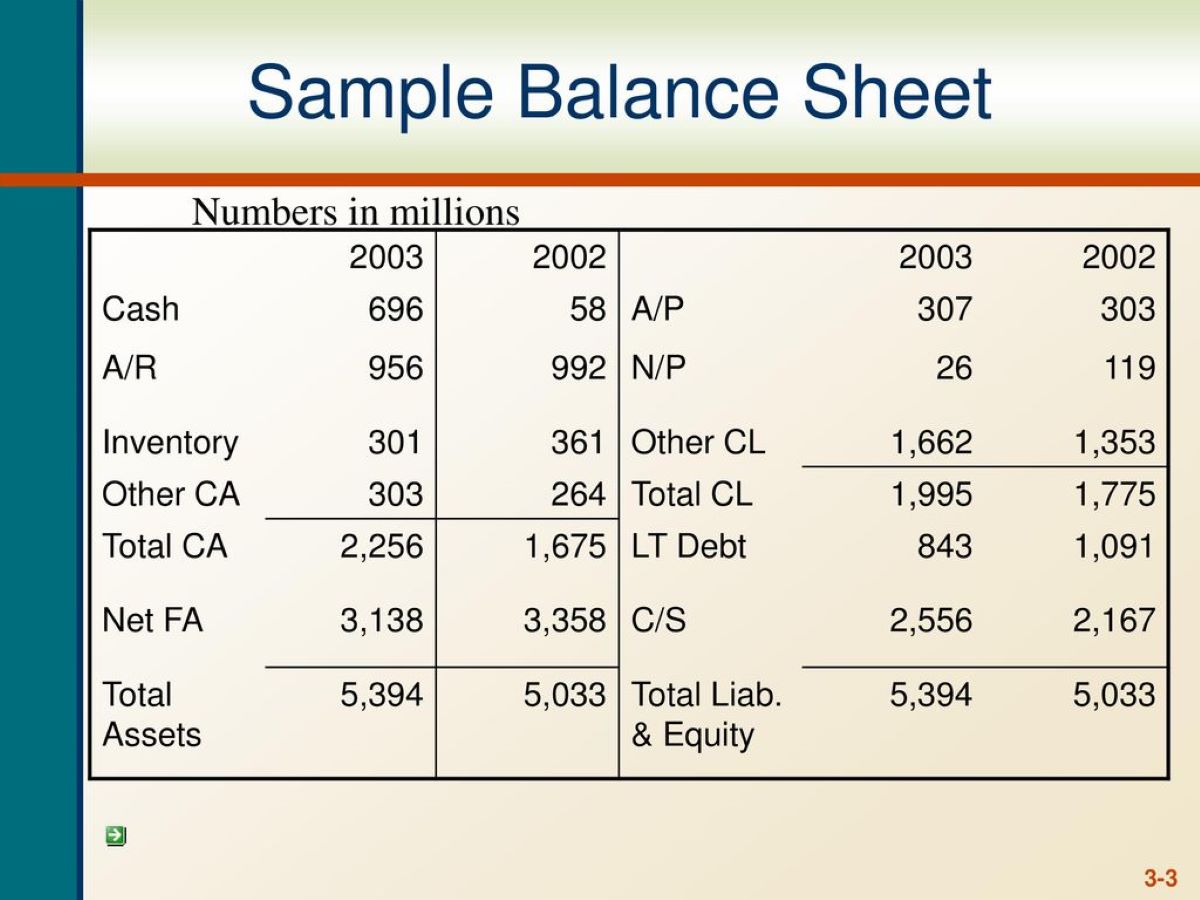

Finance
What Does Credit Balance Mean On Rent
Published: January 13, 2024
Discover the meaning of credit balance on rent and its implications in your finances. Learn how it affects your financial situation and how to manage it effectively.
(Many of the links in this article redirect to a specific reviewed product. Your purchase of these products through affiliate links helps to generate commission for LiveWell, at no extra cost. Learn more)
Table of Contents
Introduction
When it comes to renting a property, there are several terms and concepts that tenants need to be familiar with. One such concept is a credit balance on rent. Understanding what a credit balance means on rent is crucial for tenants to ensure they are aware of their financial standing with their landlord or property management company.
A credit balance on rent refers to an excess amount of money paid by the tenant to the landlord or property management company. This can occur when the tenant pays more than the agreed-upon rental amount or when they make payments in advance. Essentially, it means that the tenant has a surplus of funds that are not immediately applied to their rent payment.
While a credit balance may seem like a positive situation for the tenant, it’s important to understand the intricacies and implications associated with it. This article aims to provide a comprehensive understanding of what a credit balance on rent means, the factors that contribute to it, its importance, and how to effectively manage and utilize the credit balance.
In the following sections, we will delve deeper into the concept of credit balance on rent, explore the factors that can affect it, discuss its significance, and provide insights on how tenants can calculate and use their credit balances effectively. It’s essential to grasp this concept to make informed decisions and maintain a healthy financial relationship with your landlord or property management company.
Understanding Credit Balance on Rent
A credit balance on rent occurs when a tenant pays more money towards their rent than the actual amount owed. This can happen for various reasons, such as overpayments or making advance payments. While it may seem like a positive situation for the tenant, it’s important to understand the implications and how it is managed.
When a tenant has a credit balance on rent, it means they have a surplus amount of money with their landlord or property management company. Instead of immediately applying the excess funds towards future rent payments, the credit balance is kept as a credit in the tenant’s account. This credit can be used to offset future rental payments or can be refunded to the tenant upon request.
A credit balance on rent provides several benefits for both tenants and landlords. For tenants, it provides a financial buffer, allowing them to have a pre-paid amount available for future rent payments. This can be particularly useful in situations where they may face temporary financial constraints or unexpected expenses.
For landlords, a credit balance helps in maintaining a good relationship with tenants. It provides flexibility and convenience for the tenant and reduces the chances of late payments or non-payment of rent. Additionally, it reflects positively on the landlord’s reputation and demonstrates their willingness to work with tenants in challenging financial situations.
It’s important to note that a credit balance on rent is not the same as a security deposit. While a security deposit is a predetermined amount held by the landlord to cover any potential damages or unpaid rent at the end of the lease, a credit balance is an overpayment made by the tenant.
Managing credit balances requires open and effective communication between tenants and landlords. Tenants should regularly review their rent statements and keep track of any credit balances. It’s essential to have a clear understanding of how the credit balance will be utilized, whether it will be carried forward to future rent payments or refunded upon request.
In the next section, we will explore the factors that can contribute to the presence of a credit balance on rent. Understanding these factors will help tenants anticipate and manage their credit balances effectively.
Factors Affecting Credit Balance
Several factors can contribute to the presence and fluctuation of a credit balance on rent. Understanding these factors is essential for tenants to anticipate and manage their credit balances effectively. Let’s explore the key factors that can impact a credit balance on rent:
- Overpayment: One of the primary reasons for a credit balance on rent is when a tenant accidentally or intentionally pays more than the actual rent amount. This can happen due to errors in calculation, miscommunication, or simply misunderstanding the correct rental amount. It’s important for tenants to double-check their payment amounts to ensure they are paying the correct and agreed-upon rent.
- Advance Payments: Some tenants prefer to make advance rent payments to stay ahead of their rental obligations. For example, a tenant may choose to pay several months’ rent in advance to secure a lower rental rate or to have peace of mind knowing that their rent is covered for an extended period. In such cases, the excess amount paid will result in a credit balance on rent.
- Pro-rated Rent: Pro-rated rent occurs when a tenant moves into a rental property mid-month or vacates the property before the end of the month. In such cases, the rent for that specific period is calculated based on the number of days the tenant actually occupied the property. If the tenant pays the full monthly rent in advance, a credit balance will occur for the remaining days.
- Adjustments and Refunds: Sometimes, adjustments or refunds are credited to a tenant’s account, leading to a credit balance on rent. For example, if the landlord reduces the rent due to maintenance issues or if there are any other adjustments made to the rental amount, it can result in a credit being applied to the tenant’s account.
- Late or Partial Payments: In cases where a tenant pays rent late or makes partial payments, the landlord may choose to credit the payment towards the oldest rent due. This can create a temporary credit balance on rent until the tenant catches up with their rent payments.
It’s crucial for tenants to keep track of these factors to understand why they have a credit balance on rent. Regularly reviewing rent statements and communicating with the landlord or property management company ensures transparency and a clear understanding of how the credit balance is being calculated and managed.
In the next section, we will discuss the importance of credit balance on rent and how it can benefit both tenants and landlords.
Importance of Credit Balance on Rent
A credit balance on rent holds significant importance for both tenants and landlords. Understanding the importance of credit balances helps tenants make informed decisions about their finances and allows landlords to maintain positive relationships with their tenants. Let’s explore the key reasons why credit balance on rent is important:
- Financial Flexibility: Credit balances provide tenants with financial flexibility. Having a surplus amount in their account allows tenants to have a pre-paid balance available for future rent payments. This can be particularly useful in situations where tenants may face temporary financial constraints or unexpected expenses. It serves as a safety net and can help tenants ensure timely rent payments even during challenging times.
- Convenience and Peace of Mind: Knowing that there is a credit balance on rent gives tenants peace of mind. They can rest assured that they have funds available for future rent payments without worrying about immediate cash flow. This convenience provides tenants with financial stability and allows them to focus on other aspects of their lives.
- Positive Relationship with Landlords: Credit balances promote positive relationships between tenants and landlords. For tenants, it demonstrates their commitment to meeting their financial obligations and can foster trust and goodwill with their landlords. For landlords, it reflects positively on their reputation as accommodating and understanding property owners who work with their tenants during challenging financial situations.
- Reduced Risk of Late or Missed Payments: Having a credit balance on rent helps reduce the risk of late or missed rent payments. It provides a buffer and ensures that tenants have sufficient funds available to meet their rent obligations. This, in turn, eliminates the stress and potential conflicts that may arise due to late or missed payments.
- Flexibility for Property Changes: Credit balances can be particularly beneficial when tenants wish to make changes to their rental agreement, such as upgrading to a larger unit or transferring to another property owned by the same landlord. The credit balance can be applied towards the new rental agreement, making the transition smoother and more financially feasible for tenants.
Understanding the importance of credit balances on rent empowers tenants to make the most of their financial situation and maintain a healthy relationship with their landlords. It is crucial to communicate effectively with the landlord or property management company to clarify any concerns and ensure proper utilization of credit balances.
In the next section, we will discuss how tenants can calculate their credit balance on rent and manage it effectively.
How to Calculate Credit Balance on Rent
Calculating the credit balance on rent is essential for tenants to have a clear understanding of their financial standing with their landlord or property management company. By calculating the credit balance accurately, tenants can effectively manage their rental payments and make informed decisions about their finances. Here’s how tenants can calculate their credit balance on rent:
- Review Rent Statements: Start by reviewing your rent statements or invoices provided by your landlord or property management company. These statements detail the rent amount, any payments made, and any adjustments or refunds applied to your account.
- Identify Overpayments: Look for instances where you may have accidentally or intentionally paid more than the actual rent amount. These overpayments contribute to your credit balance. Note down the excess amount you paid for each period.
- Track Advance Payments: If you made any advance rent payments, be sure to keep track of them. These advance payments also contribute to your credit balance. Note down the total amount of advance payments made.
- Consider Pro-rated Rent: If you moved into the rental property mid-month or vacated before the end of the month, there may be pro-rated rent involved. Calculate the pro-rated amount based on the number of days you occupied the property during that specific period.
- Account for Adjustments and Refunds: If any adjustments or refunds were applied to your account, take them into consideration. These adjustments can affect your credit balance. Note down the adjustment or refund amount.
Once you have gathered this information, you can calculate your credit balance on rent by subtracting the total amount paid towards rent from the sum of any overpayments, advance payments, pro-rated rent, and adjustments or refunds. The resulting amount will be your credit balance.
It’s important to regularly review your rent statements and keep track of your credit balance. This will help you stay informed about your financial status and make decisions about how to utilize the credit balance effectively.
In the next section, we will discuss potential issues that may arise with credit balances and how to address them.
Potential Issues with Credit Balance
While credit balances on rent can provide tenants with financial flexibility and convenience, there are potential issues that may arise. It’s important for tenants to be aware of these issues and know how to address them effectively. Here are some potential issues associated with credit balances on rent:
- Miscommunication or Documentation Errors: In some cases, credit balances can occur due to miscommunication or documentation errors between the tenant and the landlord or property management company. It’s important for tenants to review their rent statements and ensure that the correct rental amounts are being recorded and applied.
- Lack of Awareness: Tenants may not be aware of the presence or amount of their credit balance if they fail to regularly review their rent statements or communicate with their landlord. This lack of awareness can result in underutilization of the credit balance or missed opportunities to request refunds when needed.
- Disagreements on Credit Balance Utilization: There may be instances where tenants and landlords have different opinions on how the credit balance should be utilized. This can lead to disagreements and strains in the tenant-landlord relationship. It’s crucial for tenants to communicate openly with their landlords to reach a mutually agreeable solution.
- Difficulty in Refund Requests: When tenants want to request a refund of their credit balance, they may face difficulties if the landlord or property management company has complex refund processes or lengthy refund timelines. Tenants should be aware of the refund policies in place and communicate their refund requests clearly and timely.
- Changes in Rental Agreement: If there are changes or modifications to the rental agreement, such as a rent increase or a switch to a different property, the credit balance may need to be adjusted accordingly. Tenants should communicate with their landlord to ensure that the credit balance is accounted for correctly in the new rental agreement.
To avoid these potential issues, tenants should proactively review their rent statements, maintain open communication with their landlords, and stay informed about refund policies and procedures. Regularly assessing and managing the credit balance will help tenants maintain a smooth financial relationship with their landlords.
In the next section, we will discuss how tenants can effectively utilize their credit balance on rent.
How to Use Credit Balance on Rent
Having a credit balance on rent provides tenants with the opportunity to utilize the surplus amount to their advantage. Here are some effective ways to use the credit balance on rent:
- Offset Future Rent Payments: The most common and straightforward way to use a credit balance is to apply it towards future rent payments. Instead of making a full payment each month, tenants can deduct the credit balance from the rent due, reducing the amount they need to pay out-of-pocket. This helps in managing cash flow and ensures timely rent payments.
- Request a Refund: If the credit balance is more than what is needed to cover future rent payments, tenants have the option to request a refund from their landlord or property management company. Simply communicate your request in writing, specifying the amount you would like refunded and the preferred method of payment. Be aware of any refund policies or procedures in place and follow them accordingly.
- Use for Property Expenses: In some cases, landlords may allow tenants to use their credit balance for property-related expenses beyond rent payments. For example, if there are repair or maintenance costs that need to be covered, tenants can request to utilize their credit balance to offset those expenses. However, it is important to discuss and obtain consent from the landlord before using the credit balance for non-rent purposes.
- Apply Toward Lease Renewal or Upgrades: If tenants plan to renew their lease or upgrade to a larger unit within the same property, they can use their credit balance to offset any applicable fees or expenses associated with the process. This allows tenants to make changes to their rental agreement without incurring additional financial burdens.
- Consider Shared Expenses: If the rental property has shared expenses such as utilities, tenants can discuss with their landlord the possibility of using their credit balance to cover their share of the expenses. This can provide flexibility in managing monthly bills and ensure that the credit balance is utilized effectively.
It’s important for tenants to communicate openly and transparently with their landlords when it comes to utilizing the credit balance. This helps establish mutual understanding and ensures that the credit balance is used in a way that benefits both parties.
Remember, effective utilization of the credit balance is dependent on clear communication, understanding of refund policies, and compliance with any rental agreement terms. By utilizing the credit balance wisely, tenants can maximize its value and maintain a harmonious financial relationship with their landlord or property management company.
To wrap up, it’s crucial for tenants to be aware of their credit balance, regularly review their rent statements, and communicate with their landlords to effectively manage and utilize the surplus amount.
Do you need further assistance with anything else?
Conclusion
Understanding credit balances on rent is crucial for tenants to maintain a healthy financial relationship with their landlord or property management company. It provides financial flexibility, convenience, and peace of mind for both parties involved. By having a clear understanding of what a credit balance means, the factors that affect it, and how to calculate and utilize it effectively, tenants can make informed decisions about their finances.
Throughout this article, we have explored the concept of credit balance on rent, its importance, and the various factors that contribute to its presence. We have also discussed potential issues that may arise with credit balances and provided insights on how to address them. Additionally, we have highlighted different ways tenants can utilize their credit balances, such as offsetting future rent payments or requesting refunds.
To effectively manage credit balances, tenants should regularly review their rent statements, keep track of their financial transactions, and maintain open communication with their landlords or property management companies. This ensures transparency, avoids misunderstandings, and allows for timely resolution of any concerns.
Remember, each rental situation may have its unique aspects, so it’s important to refer to your specific lease agreement and consult with your landlord or property management company for any specific guidelines or policies regarding credit balances. By doing so, you can navigate the process confidently and optimize the benefits of your credit balance on rent.
In conclusion, credit balances on rent provide tenants with financial flexibility, peace of mind, and a positive relationship with their landlords. By understanding, managing, and utilizing credit balances effectively, tenants can maintain timely rent payments and establish a strong foundation for their tenancy.














